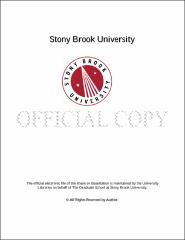| dc.identifier.uri | http://hdl.handle.net/11401/77501 | |
| dc.description.sponsorship | This work is sponsored by the Stony Brook University Graduate School in compliance with the requirements for completion of degree. | en_US |
| dc.format | Monograph | |
| dc.format.medium | Electronic Resource | en_US |
| dc.language.iso | en_US | |
| dc.publisher | The Graduate School, Stony Brook University: Stony Brook, NY. | |
| dc.type | Dissertation | |
| dcterms.abstract | This dissertation examines the counterfactual – the consideration of “what might have been†– as a key political, ethical, and aesthetic tool of the literature of modernism. As an imagining of other possibilities than what came to pass, the counterfactual unveils alternative spaces and times that lie outside of traditional narrative structure. I establish that counterfactual time is an empowering political and ethical space. Beginning with an extended discussion of James Joyce’s Ulysses, I show how counterfactual thinking challenges the discursive power of historical narrative and thus enables the expression of marginalized or silenced histories and experiences. In doing so, I depart from a widespread critical assumption that an interest in the counterfactual characterizes only the postmodern era, and I chart an alternative genealogy of modernism that establishes the persistence of modernist counterfactual time through the twenty-first century. My subsequent chapters examine postwar and contemporary authors who draw upon this modernist practice in order to confront specific ethical and political challenges. For example, I consider how the authors Samuel Selvon and J. M. Coetzee respond to and transform modernist counterfactual time in order to address the creation of art in the era of decolonization. I argue that Graham Swift, Michael Ondaatje, Ian McEwan, and Julian Barnes use counterfactual time to challenge, as well as redress, ideologically weighted narratives of British dominance. I develop a politics and ethics of the counterfactual form, which I argue has become a key mode for responsible engagement with the complex political and cultural landscape of the twenty-first century. As such, my dissertation reroutes the critical conversation about modernist genealogies. | |
| dcterms.available | 2017-09-20T16:52:49Z | |
| dcterms.contributor | Marshik, Celia | en_US |
| dcterms.contributor | Manning, Peter | en_US |
| dcterms.contributor | Olster, Stacey | en_US |
| dcterms.contributor | Saint-Amour, Paul K.. | en_US |
| dcterms.creator | Brinkmeyer, Emma | |
| dcterms.dateAccepted | 2017-09-20T16:52:49Z | |
| dcterms.dateSubmitted | 2017-09-20T16:52:49Z | |
| dcterms.description | Department of English | en_US |
| dcterms.extent | 224 pg. | en_US |
| dcterms.format | Application/PDF | en_US |
| dcterms.format | Monograph | |
| dcterms.identifier | http://hdl.handle.net/11401/77501 | |
| dcterms.issued | 2016-12-01 | |
| dcterms.language | en_US | |
| dcterms.provenance | Made available in DSpace on 2017-09-20T16:52:49Z (GMT). No. of bitstreams: 1
Brinkmeyer_grad.sunysb_0771E_13048.pdf: 1314066 bytes, checksum: c6a7445d41db125c1ffe468b9eea204a (MD5)
Previous issue date: 1 | en |
| dcterms.publisher | The Graduate School, Stony Brook University: Stony Brook, NY. | |
| dcterms.subject | English literature -- Modern history -- Ethics | |
| dcterms.subject | counterfactual, modernism, narrative, postmodernism, retellings, temporality | |
| dcterms.title | Retellings and Counterfactual Narratives: The Possibilities of Twentieth- and Twenty-First-Century British Literature | |
| dcterms.type | Dissertation | |

